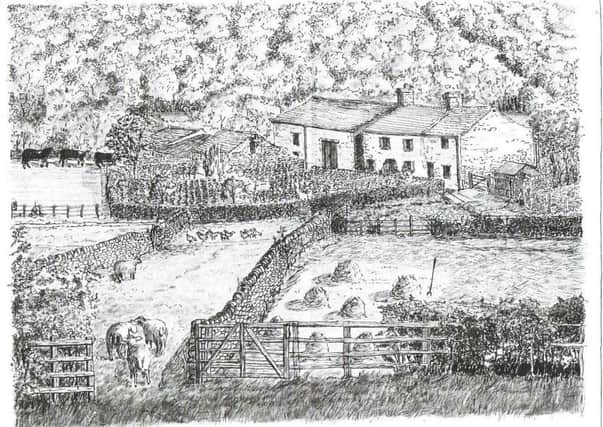Mucking into 1940s farming life was hard work for all the family


There was no electricity, it didn’t arrive until the 1950s. Lighting was by paraffin lamp or candles.
Power consisted of one horse, one mowing machine and manpower. The toilet was a composting one across the yard and around a corner.
The manpower was largely the Miller family.
Advertisement
Hide AdAdvertisement
Hide AdThe first job in the morning was to get the cows in for milking. The cows, Shorthorns, with horns, 12 in total, all had names, all colours.
We would go to the gate of the field and shout ‘owp’. They would then come, with a bit of encouragement, to their stalls in one of two shippons, each holding six cows, one on each side of the yard. They knew their places.
Before milking began, with a three-legged stool and bucket, the cows would be given a bucket with cow cake. The milk would be passed through a cooler, put into a kit and then barrowed along the lane to a stand alongside the Wennington Road and lifted on to be picked up by the MMB lorry.
With the cows back in the field the job of mucking out would begin. The muck was barrowed to the edge of the farmyard.
Advertisement
Hide AdAdvertisement
Hide AdFrom there it would be forked into the cart, taken to a meadow, raked into heaps, six strides apart.
It would then be spread out with a fork later on. Then it would be barrowed by Nellie the horse, pulling along a large chain link device which broke the muck into fine pieces.
Nellie the horse was a feisty black Galloway 14 hands high. She had been taught to trot so when she was pulling the empty cart it was a bit like chariot racing.
She was a devil to catch for work. She knew what was coming and would need manoeuvring into the corner of the field before a halter could be slipped over her neck – a handful of cattle cake helped.
Advertisement
Hide AdAdvertisement
Hide AdOnce in the yard a collar, bridle and saddle would be put on and she would be ready.
There would be four hen huts on the farm with about 36 hens in each. They were a cross between Rhode Island Reds and White Sussex, very placid hens.
The new chicks would arrive as day olds, fluffy yellow. They needed careful looking after, kept warm, fed and watered. They would eventually fledge and become pullets then laying hens.
The huts had nesting boxes along one side and perches on the other. They were let out during the day, fed grain, allowed to scratch about, then when they had gone to perch they would be shut in so that foxes could not get at them.
Advertisement
Hide AdAdvertisement
Hide AdEggs were collected each day and collected by the EMB each week.Every year a hut would be taken apart and moved to a new area with clean grass.
Between October and April hoggets would be taken from a fell farm to overwinter in the fields and meadows, about 36 in all. The cows and heifers would be inside at this time.
The hedges and fences needed to be in good order to prevent them escaping. ‘Hogs’ are used to wandering about on the fells.
Whenever a dry cow came into season it would be walked up to visit the bull at Ashley’s Farm about half a mile away.
Advertisement
Hide AdAdvertisement
Hide AdWhenever Nellie needed new shoes she would be walked up to the blacksmiths’ smithy at the Green above Bentham, about two miles away.
Young heifers would be walked up to the pasture near Dick Hill in the spring for the summer months. Young calves would be weened off milk, turned out, away from the cows, and fed a watery gruel-like substance until they became heifers.
If an animal needed to be bought or sold my father would need to attend the auction mart in High Bentham, and he would need to get there by bus or bike. He would discuss the business of the day with fellow farmers.
There was always a job to be done.
My mother delivered milk to neighbours around the village, did the washing, baking, ironing and decorating, as well as working like a man during the hay making season.
Advertisement
Hide AdAdvertisement
Hide AdOn one day a year she took us kids to Morecambe for the day. During the war years we were encouraged to grow wheat and root vegetables, so we had to plough up part of the larger meadow. In this we were helped by a contractor with a tractor and plough. The driver was a German prisoner of war. His descendants are still around to this day.
Entertainment was provided by a radio, a valve set. It was powered by lead/acid batteries which had to go to Bentham to be charged up. Mrs Wyne was the agent for collection.
Playing cards, dominoes and board games were in frequent use. My mother went to whist drives at Wray occasionally. My father would sit and fiddle with the radio stations.
I remember Radio Luxembourg and the news stations.
My father was in the Home Guard during the war. He was in a platoon in Wray and would join them for exercised once a month on Sundays.